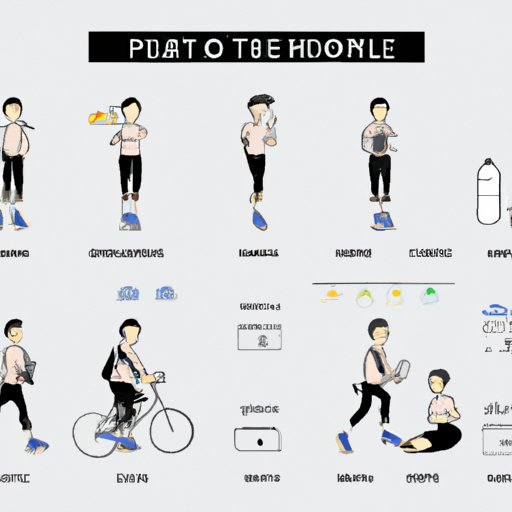Introduction
Exercise is any type of physical activity that requires energy expenditure. It can range from light activities such as walking or jogging to more strenuous activities such as weightlifting or sprinting. Nutrition plays an important role in exercise, as it helps to fuel the body and support its recovery afterwards. Therefore, it’s important to consider whether you should eat before or after exercise.
Eating Before Exercise
Eating before exercise can be beneficial for providing the body with energy and ensuring that it has adequate fuel for the activity. According to a study published in the International Journal of Sport Nutrition and Exercise Metabolism, “It is generally recommended that athletes consume carbohydrate-containing meals or snacks within 2 hours prior to exercise.” This gives the body enough time to digest the food and use it for energy during the activity.
However, there are some drawbacks to eating before exercise. Eating too close to the start of the activity can cause digestive discomfort and lead to an upset stomach. Additionally, if the meal is too large, it may cause fatigue during the workout. Therefore, it’s important to time your meals appropriately and ensure that they are not too large.
Timing is also important when it comes to pre-exercise nutrition. A study published in the journal Medicine & Science in Sports & Exercise found that consuming carbohydrates 4 hours before exercise led to improved performance compared to eating immediately before exercise. Therefore, it’s important to plan ahead and time your meals accordingly.
Pre-exercise nutrition also impacts energy levels during exercise. A study published in the journal Nutrients found that consuming carbohydrates before exercise increased energy levels during the activity and improved performance. Therefore, it’s important to include carbohydrates in your pre-exercise meal in order to maximize your energy levels and performance.
Eating After Exercise
Eating after exercise is just as important as eating before exercise. The type of food you eat after exercise can have a significant impact on your recovery. For example, a study published in the journal Nutrients found that consuming carbohydrates and protein after exercise improved muscle recovery and reduced muscle soreness. Therefore, it’s important to include both carbohydrates and protein in your post-exercise meal.
Hydration is also important when it comes to pre- and post-exercise eating habits. A study published in the journal Nutrients found that drinking fluids before, during, and after exercise improved exercise performance and reduced fatigue. Therefore, it’s important to stay hydrated in order to maximize the benefits of pre- and post-exercise nutrition.
Finally, pre- and post-exercise nutrition can play a role in weight loss. A study published in the journal Obesity Reviews found that consuming a meal before exercise can increase fat burning during the activity. Additionally, consuming a meal after exercise can help to reduce hunger and cravings later in the day. Therefore, it’s important to pay attention to your pre- and post-exercise nutrition in order to maximize the benefits for weight loss.
Conclusion
In conclusion, both pre- and post-exercise nutrition are important for optimizing performance and recovery. Eating before exercise can provide the body with energy and improve performance during the activity. However, it’s important to time your meals appropriately and ensure that they are not too large. Eating after exercise is also important, as it can help to reduce muscle soreness and aid in recovery. Additionally, staying hydrated throughout the activity can help to maximize the benefits of pre- and post-exercise nutrition. Finally, pre- and post-exercise nutrition can play a role in weight loss. Therefore, it’s important to pay attention to your pre- and post-exercise nutrition in order to maximize the benefits for weight loss.
In summary, eating before or after exercise can both have their benefits and drawbacks. It’s important to consider the timing of your meals, the types of food you consume, and the importance of staying hydrated in order to optimize your performance and recovery. Additionally, paying attention to pre- and post-exercise nutrition can help to maximize the benefits for weight loss.
(Note: Is this article not meeting your expectations? Do you have knowledge or insights to share? Unlock new opportunities and expand your reach by joining our authors team. Click Registration to join us and share your expertise with our readers.)
